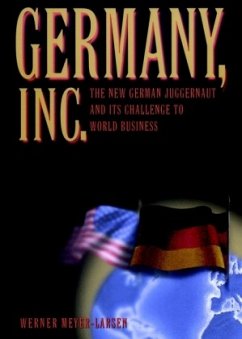"Ten strong egos, three different strategies, and one major target. Enter Deutschland AG: Volkswagen v. Ford; Bertelsmann v. Time Warner; Hoechst, BASF, and Bayer v. DuPont; Allianz v. Metropolitan Life; Lufthansa v. American Airlines; Airbus v. Boeing....The contest is thrilling, intoxicating even. The figures of Deutschland AG versus those of Corporate America- everything is so right, it's really wrong, when you come right down to it." As Japan's sun sinks slowly in the West, a formidable new competitor has risen to replace her as America's chief rival in the battle for global business leadership. Emboldened by reunification and its role as leader of the European Union, Germany is flexing its muscles. For the first time in history, a transatlantic global conglomerate is rapidly taking shape, its policies defined by a small band of German business elites. What are the economic, sociopolitical, and cultural forces driving the new German expansionism? What is the strategy behind it, and how threatening is it really? Who are the major players involved and what can we expect from them in the years ahead? How do Germany's plans fit with the ultimate unification of European economies under the euro? And perhaps most intriguing, to what extent has American post-cold war policy been deliberately skewed to encourage the hegemony of Germany, Inc., and why? Written by Werner Meyer-Larsen, a journalist who has closely covered the transatlantic business beat for over a decade, this book provides answers to these and other questions of crucial importance to every businessperson. While the merger of Daimler-Benz and Chrysler in March 1999 is popularly held to have been the opening shot in a new war of global attrition, it was, as Meyer-Larsen explains, in reality a major turning point in a German offensive that has been quietly gaining ground for some years. Since the late 1980s, a handful of Germany's most powerful industrial concerns has been steadily chipping away at America's lead in a range of sectors, including publishing, air travel, steel, insurance, and cars. Leading the attack is a new generation of ambitious young executives, unencumbered by the political restrictions (or sins) of their predecessors, and bolstered by a virtual banking cartel controlled by Deutsche Bank. Compelled as much by their anxiety over the post-cold war power vacuum as a desire to strut their stuff on a global scale, their battle cry is "Go West! Think big!" Meyer-Larsen traces the growth of these companies and the evolution of Germany, Inc. He takes us inside Daimler, Lufthansa, VW, Bertelsmann, Hoechst, Siemens, Allianz, and the other top players to reveal their strategies. And he provides vivid portraits of the men who control their reins-including Ferdinand "the Shark" Piech of VW; Bertelsmann's Thomas Middelhoff, a.k.a. "Mr. Spock"; "Mr. Stockmarket," Rolf E. Breuer of Deutsche Bank; and Gerhard Crommer of Krupp, the "Spider in the Web of Steel"-explaining, in each case, the likely impact of each leader's style on the future of his industry. A penetrating, fact-filled exploration of a development of paramount commercial, geopolitical, and cultural importance, Germany, Inc. is must reading for businesspeople, policymakers, and students of current affairs everywhere.Während sich das japanische Wirtschaftswunder dem Ende nähert, richten deutsche Unternehmen in Europa ihr Augenmerk verstärt auf Amerika. Die jüngste Übernahme von Chrysler durch Daimler ist ein aktuelles Beispiel, es zeichnen sich aber auch Veränderungen in anderen Branchen ab, z.B. in Verlagen (Bertelsmann), in Chemie- und Finanzunternehmen. Dort, wo Übernahmen oder Technologiekäufe nicht möglich sind, werden Konkurrenzunternehmen zu den amerikanischen Marktführern ins Leben gerufen. Diese Entwicklung ist nicht nur Symbol für einen Machtkampf zwischen Unternehmen, sondern gleichsam für ein hartes Aufeinandertreffen westlicher kapitalistischer Kulturen. Deutschland legt großen Wert auf Hierarchie, Lohngleichheit und die Zusammenarbeit mit den Gewerkschaften und verfügt zwar über eine qualifizierte aber nur wenig kreative Arbeiterschaft. In Amerika ist die Situation genau umgekehrt. Dieses einzigartige Buch untersucht die langfristigen Konsequenzen dieser Entwicklung für die Weltwirtschaft und zeichnet lebendige Porträts von Deutschlands großen Firmenchefs, wie z.B. Jürgen Schrempp (Daimler), Thomas Middlehoff (Bertelsmann), Jürgen Weber (Lufthansa) und Heinrich von Poerer (Siemens).
Bitte wählen Sie Ihr Anliegen aus.
Rechnungen
Retourenschein anfordern
Bestellstatus
Storno

